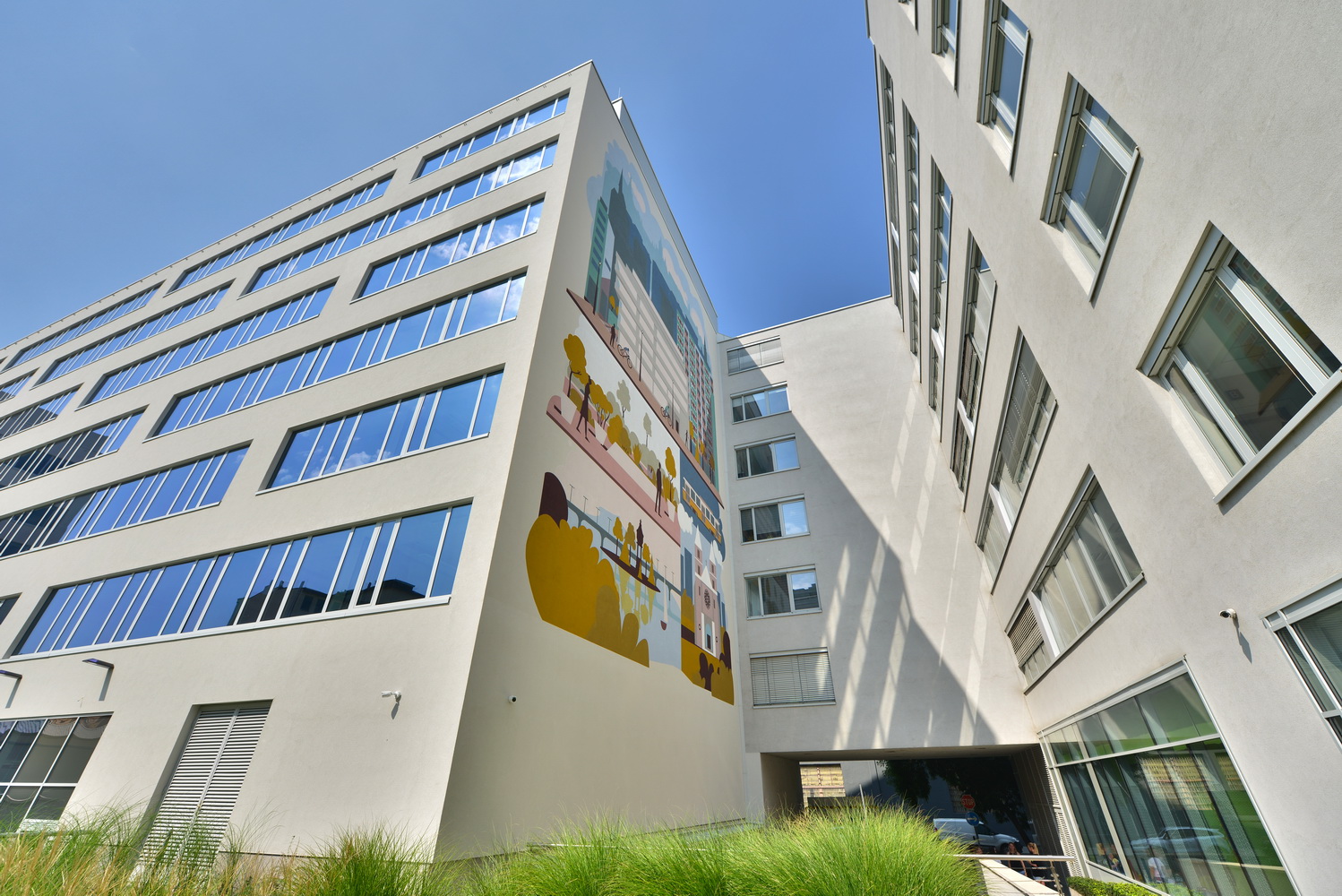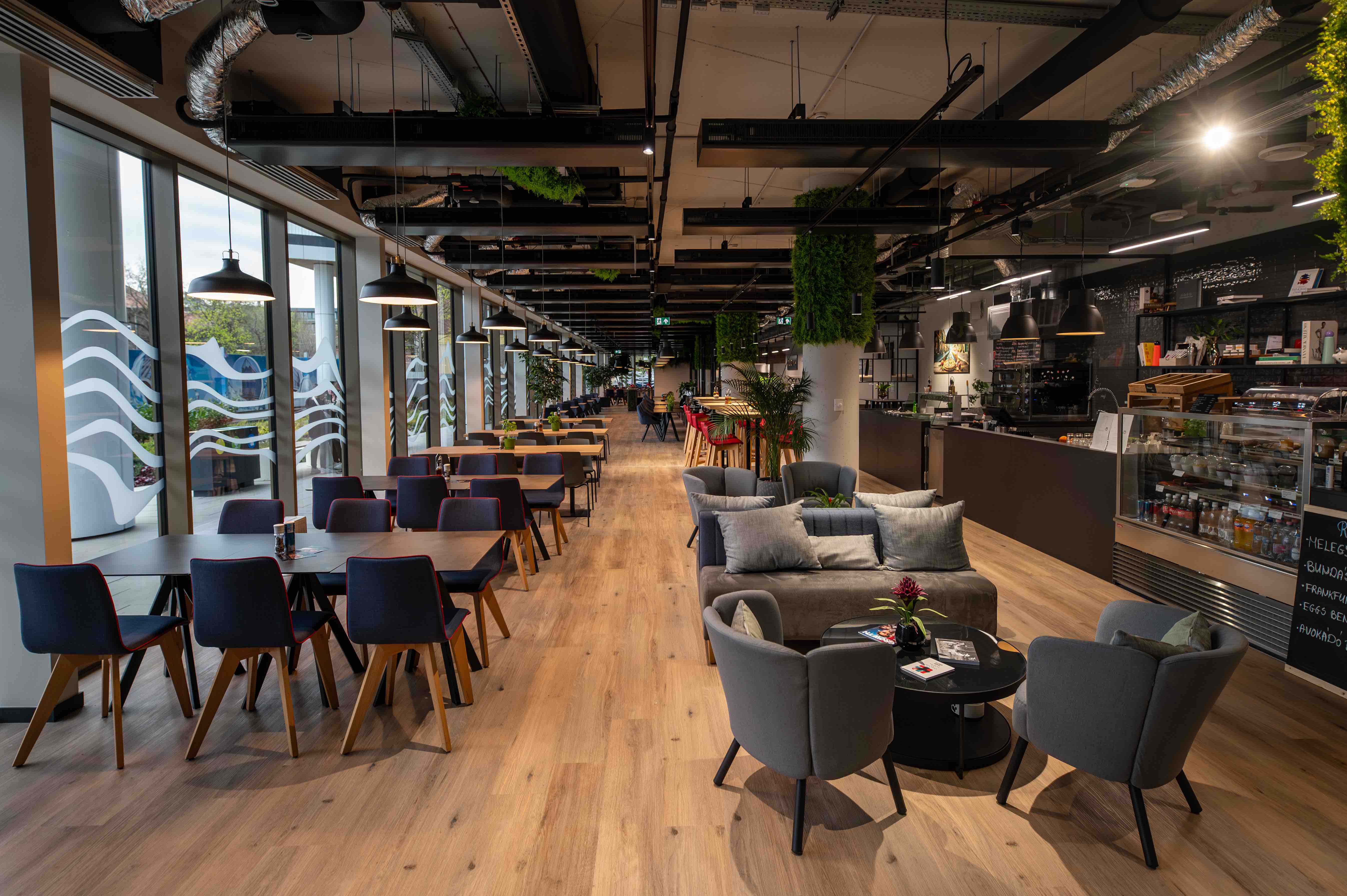SSCs Operating at top end of Office Market

Shared services centers and business process outsourcing, now often referred to as the business services sector, have become one of the major industries in Hungary and one of the main drivers of success for Hungarian and Central European office markets.
Balance Hall
The first SSCs came to Hungary in the 1990s and the industry has expanded rapidly over the last two decades, creating employment opportunities and enabling high quality office complexes to be developed, which in turn upgrades the infrastructure and attracts investors.
Central European governmental agencies such as the Hungarian Investment Promotion Agency have successfully been promoting their respective countries as quality but cost-effective SSC destinations, and there are now around 120 such centers operating in Hungary according to KPMG.
SSCs are increasingly undertaking increasingly complex functions beyond a merely administrative role such as R&D. Tenants therefore require more sophisticated specifications and higher sustainability accreditations, thus companies are looking to source centers at offices at the very top end of the market.
The ratio of SSCs/BPOs in the total take up of the Budapest Office Market in 2019 was 25% according to Nikolett Püschl, leasing and development manager at Atenor Hungary.
Thom Barnhardt, organizer of the annual “CEE Business Services Summit & Awards” in Warsaw, estimates that, based on various research reports from organizations such as the European Business Services Association and the Hungarian Outsourcing Association, as well as real estate agencies, 40-50% of Central Europe and Hungary office demand/take up is from SSCs/BPOs.
“The SSC sector is a key component of demand in the office sector and a vehicle for inward investment across CEE,” he comments.
From a demand perspective, SSCs and BPOs are widely regarded as one of the major components of demand in the Budapest office market.
“The profundity of talent base and affordability of labor are key drivers. The amount of competent human resources obviously correlates with the size of the destination country and the actual city,” says Balázs Simonyi, leasing director at CPI Hungary.
“On the other hand, smaller countries with a centralized geographical location and easy accessibility, like Hungary, can become a kind of regional hub of talents by being attractive enough to temporarily relocate to,” he adds.
Complex Definitions
A definition of what constitutes an SSC has become more complex as the sector has developed. According to the Hungarian and Polish portal, SSC Heroes, the difference between BPOs and SSCs is essentially the question of whom the services are provided for.
SSCs are not third party service providers but service providers to their mother companies. In a BPO, a third party provides specific services to a company on a contract basis.
“Shared services centers are also called business services centers (BSCs), centers of excellence (CoE), and global business services (GBS). They all share characteristics of being so-called ‘captive’ business-services centers providing services (finance and accounting, operations, HR, client services, etc.) to their parent company,” says Barnhardt.
“These are usually focused on the EMEA region but often services are provided globally. BPOs, on the other hand, provide these same services but to external clients. Names such as TCS, Wipro, WNS, Luxoft come to mind. They are intensely focused on improving processes so that they are as efficient as possible,” he says.
“Perhaps the biggest change – or trend – is the move to automate these white-collar processes. RPA companies like UiPath and AutomationAnywhere have soared to multi-billion dollar valuations as they have been able to offer software services that extract additional 20-80% of costs savings from these business-services processes,” Barnhardt explains.
“Also the services inside SSCs are evolving to include areas like R&D, legal process outsourcing, medical services – imagine a doctor in Budapest reviewing X-Rays for a London-based insurance claims company – and graphic design at scale. And of course digital/tech/IT services. As the global digital infrastructure continues to improve, new areas will emerge,” he adds.
From a real estate perspective the basic requirement has been that there is a stock of well-located class “A” office space with a premium on public transport links, interiors and well-being and, latterly, interior organization undertaken with regard to the coronavirus. Companies are prepared to invest in a better working environment and implement an active design and layout that potentially increases employee productivity.

Nordic Light Trio
Take-up
“In general, I would say around 25% of the total CPI Hungary portfolio take-up is by SSCs/BPOs. The actual figure is very different based on the characteristics of the given building. We have locations, schemes which are predominantly attracting such organizations,” comments Simonyi.
He defines an SSC as “an entity responsible for the execution of specific operational tasks (such as accounting, human resources, payroll, IT or purchasing), which could be considered a way of outsourcing, but within the global network of a company. Business process outsourcing (BPO) is a method of subcontracting similar business-related operations to third-party vendors.”
Budapest-headquartered developer Eston International Zrt. says of Hungary, “The expansion of SSCs and BPOs are highly supported by lower employment costs paired with adequate professional qualifications (i.e. university degree and foreign language knowledge) as well as developed infrastructure and high quality modern office stock. Also, Hungary has a decent coverage in terms of high speed internet and mobile networks. In terms of locations, Budapest is the main target of such operations along with larger towns where universities are located.”
The Váci Corridor is generally regarded as an excellent SSC location that has transformed District XIII in the last 20 years. The South Buda area has also been attracting demand.
In the Váci Corridor, the international pharmaceutical company Roche Services (Europe) has established its headquarters at the 14,000 sqm Nordic Light, designed by Paulinyi & Partners Zrt. The office has more than 1,000 employees and provides global support and consultancy to more than 120 Roche subsidiaries in finance, procurement, human resources and IT processes.
The pharmaceutical industry has, by its nature, done well in the health crisis, but others, however, such as hospitality SSCs have been negatively impacted by the pandemic. That said, all SSCs have been forced to take on elements of home working and the technical, property management issues this involves.
Sustainability accreditations have become a basic market requirement and are by now integrated into the office design. Thus Roche, developer Skanska, Paulinyi & Partners and the owner of Nordic Light (the property was pre-sold to the South Korean investment trust, JR AMC) spent a year cooperating on the design of the complex.
“We are together committed to the environment and innovation along with the health and safety of our employees as well as partners. Nordic Light Trio, our first project to be WELL certified, was designed and built to offer qualitative characteristics to benefit the body and mind,” says Alexandra Tomášková, EVP of operations for Hungary and the Czech Republic at Skanska.
“Bicycle parking, showers and lockers for bikers along with a multifunctional public garden and green terraces encourage physical activities as well as opportunities for relaxation,” she says.
Open-space
With regard to the impact of the coronavirus on the SCC sector, Simonyi of CPI argues that there are tendencies like the hybrid-use of blending home office with normal operations or the fading dominance of open-space configurations.
“Thus, we must wait to see another 8-12 months to have the representative amount of experience. I believe we are on the right path; therefore, we only have to keep up the good work. Legislation should support that the country can attract more and more talents from the region. On the other hand, governmental subsidies should stay and be extended wherever it is possible. As far as the ample supply of quality office schemes goes, I am quite positive that will not prove to be the bottleneck.”
Atenor’s Püschl sees the key country requirements of SSCs/BPOs as a sufficient availability of well-educated, multi-lingual people at the lowest possible labor cost. The country should be able to provide tailor made incentive offers and should have competitive labor market and tax regulations.
Further, the location and accessibility of the country as well as good infrastructure are very important. Therefore, university cities are the most preferred locations, with direct access to public transport and a well serviced micro environment. The base criteria for the building and its property management should be class “A” or “A plus” with efficient, modern technology, green certification and well-being solutions. COVID-19 has brought health and safety aspects and smart business solutions more into focus.
Barnhardt argues that higher education is the core foundation for attracting SSCs and BPOs. After that, governments need to reward employment and be careful that their social security costs on top of labor costs do not become too excessive.
Both Hungary and Poland have sought to decentralize SSCs away from the capital city to secondary cities with great results. In Hungary, Debrecen stands out as a winner, partially because the local government is aware of the big potential of SSCs. Another key area is making sure that the digital infrastructure is world-class.
“I believe the pandemic has put these service in a new perspective in terms of sustainability of operation. Some locations have proved to be more resistant than others. Also geographical distance between the client (whether internal or third party) and the service provider could become a much stronger consideration in the future. I expect the tendency to be that these service operations are re-located to CEE countries from more distant locations like, for example, India,” concludes Simonyi.
SUPPORT THE BUDAPEST BUSINESS JOURNAL
Producing journalism that is worthy of the name is a costly business. For 27 years, the publishers, editors and reporters of the Budapest Business Journal have striven to bring you business news that works, information that you can trust, that is factual, accurate and presented without fear or favor.
Newspaper organizations across the globe have struggled to find a business model that allows them to continue to excel, without compromising their ability to perform. Most recently, some have experimented with the idea of involving their most important stakeholders, their readers.
We would like to offer that same opportunity to our readers. We would like to invite you to help us deliver the quality business journalism you require. Hit our Support the BBJ button and you can choose the how much and how often you send us your contributions.









